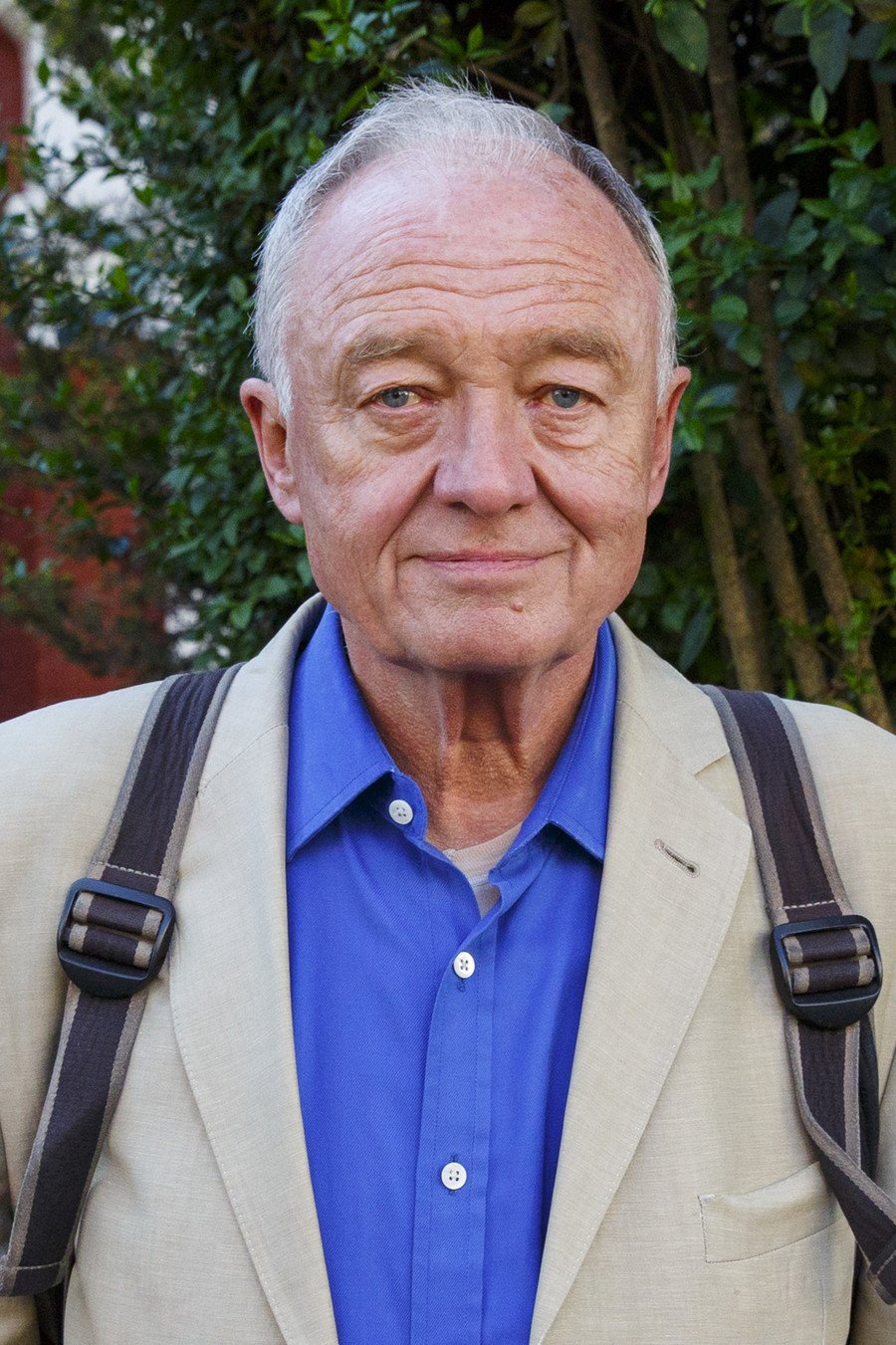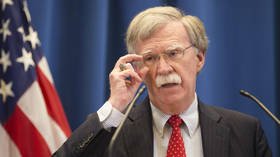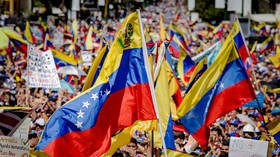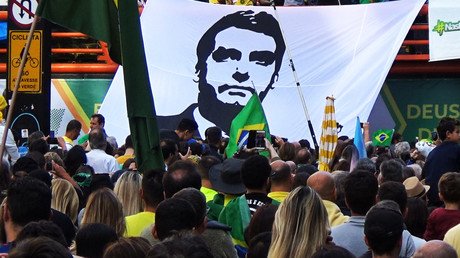Not just Venezuela, Nicaragua & Cuba also in firing line of US imperialism (by K. Livingstone)
Both historical and current experience in Central and Latin America shows the social progress and people’s rights are not things that are on the agenda of US-installed regimes.
The crisis in Central America continues to escalate. Last week, President Maduro of Venezuela released a Facebook video warning that leaders of the US empire were conspiring “to get their hands on our oil – just like they did in Iraq and in Libya.” The US can’t accuse Venezuela of accumulating weapons of mass destruction, as they said about Saddam Hussein in Iraq, but instead they are behind a fake news campaign to try and justify intervening in Venezuela which has the world’s largest oil reserves, Maduro stated.
Maduro warned“If the US intends to intervene against us they will get a Vietnam worse than they could have imagined. We do not allow violence. We are a peaceful people…. I ask that Venezuela be respected and I ask for the support of the people of the US so there isn’t a new Vietnam, least of all here in our America.”
Whilst it still seems such a war can be avoided, the right-wing governments of Colombia and Brazil would be prepared to be part of a US-led coalition against Maduro.
For those of us old enough to remember the long bloody war in Vietnam, it was alarming to see that John Bolton, the US National Security Adviser, was photographed holding a legal pad with the words ‘5,000 troops to Colombia’ which made us all fear that Trump is actually considering the option. But 5,000 would not be enough as we all remember that the invasion of Panama required 27,000 US soldiers.
There has clearly been US backing for the street protests organized to try and drive Maduro out of office and bring an end to the socialist administration started by Hugo Chavez in 1998. Since the assembly member Juan Guaido announced he was in effect the real president of Venezuela he has had backing not just from the US, but the UK, France, Spain, Colombia, Canada, Australia, Brazil and the European Parliament.
Guaido is clearly no more than a puppet of Donald Trump and could easily be the key player in a coup to overthrow the democratically elected regime. Last week, Venezuela’s Vice President Delcy Rodriguez accused America of conspiring to topple her president in order to seize the country’s oil reserves. She announced that their response would be “Get your Yankee hands off the oil industry.”
Given the number of European countries lining up behind Trump’s plot, it was good to see the Labour leader Jeremy Corbyn coming out strongly against the call for sanctions: “We oppose outside interference in Venezuela… there needs to be a dialogue and a negotiated settlement to overcome the crisis.”
The future of Venezuela is a matter for Venezuelans. @Jeremy_Hunt's call for more sanctions on Venezuela is wrong. We oppose outside interference in Venezuela, whether from the US or anywhere else.There needs to be dialogue and a negotiated settlement to overcome the crisis.
— Jeremy Corbyn (@jeremycorbyn) February 1, 2019
But it’s not just Venezuela. On December 20, Trump signed into law the NICA act (Nicaraguan Investment Conditionality Act). This act seeks to use the US’s “voice, vote and influence” within international financial institutions such as the World Bank, the International Monetary Fund and the Inter-American Development Bank to stop them providing“any loan or financial or technical assistance” to Nicaragua’s government.
This is of course extremely significant as the US is a strong and at times dominant voice in these institutions and a voice that many other governments do not want to be at odds with. The act also gives Trump the authority to impose targeted sanctions on Nicaraguan government officials, former officials, or people purportedly “acting on behalf of” the government in Nicaraguan’s capital Managua.
The US Secretary of State is instructed by the act to submit a report to congressional committees within six months as to whether the Nicaraguan government is complying with a range of US demands including a demand for early elections. The US demand for an early election is outrageous given that Nicaragua’s elected president Daniel Ortega is less than halfway through his constitutional term of office, having won the last presidential election in 2016 with 72 percent of the vote on a turnout of around 65 percent.
By incorporating the International Emergency Economic Powers Act, the NICA act also paves the way for President Trump to go even further in infringing Nicaraguan’s sovereignty. Powers granted to Trump under this act enable him to block and prohibit financial and other asset transactions and deny or revoke visas and similar measures have been the precursor for further US interventions in countries when they want to see left-wing governments overthrown.
The legislation is a clear violation of international law and the Charters of the United Nations and the Organization of American States, both of which condemn such actions. The campaign behind the NICA act within the US was largely led by recently retired ultra-conservative Florida congressional representative Ileana Ros-Lehtinen, with help from senators Marco Rubio and Ted Cruz. Their political history includes aggressive support for the blockade of Cuba and sanctions against Venezuela.
The NICA act supporters hope it will cut off financial loans to Nicaragua from the World Bank, International Monetary Fund and other lenders. Loans to Nicaragua are currently running at $250 million a year and are invested in education, social programmes, electrification, roads, and other infrastructure initiatives.
One such project that might be jeopardized is a $60 million World Bank-funded project to strengthen the health care system in Nicaragua, part of a drive to improve health and education services. Additionally, there is a danger that donor nations may use the negative IMF loan decisions to guide their own bilateral aid and loans, creating a multiplier effect and cutting off some European aid as well.
The NICA act will be a heavy additional blow to what had been achieved under the Sandinista government’s poverty reduction programme, under which the poverty rate was cut from 45.8% of the population in 2005 to 24.9% in 2016. These sanctions will hit the poorest hardest, whether or not they support their current government. Trump clearly hopes it will spark a revolt that overthrows the government.
History in the region and elsewhere shows US sanctions exacerbate a country’s divisions rather than help move countries forward. This is why the NICA act has been opposed by a wide range of voices including business and trade unions in Nicaragua. The reality is that the NICA act has nothing to do with human rights, democracy or the rule of law. It is only about US interest in its economic involvement in each country.
The act is designed to help Trump’s administration achieve regime change, not just in Nicaragua but they hope also in Venezuela and in Cuba with Brazil having been delivered back into the hands of a pro-US extreme right-winger, following the impeachment of Dilma Rousseff, and the jailing of Lula, who was the front runner in the presidential elections before charges against him were cooked up to take him out of the contest.
Statements by White House National Security Adviser, John Bolton, and Secretary of State Mike Pompeo make this abundantly clear. On November 1, 2018, Bolton denounced Nicaragua, Cuba, and Venezuela as a “troika of tyranny” and saying that he looks forward to watching their governments fall.
But the simple fact is that it is against international law for the Trump administration to decide who should be the government of any other country. Both historical and current experience in Central and Latin America shows us the social progress and people’s rights are not things that are on the agenda of US-installed regimes.
There is a wide range of views on recent developments in Nicaragua within the left internationally, but whatever one’s views, sanctions from Trump that will damage living standards of ordinary people are not the answer.
For almost thirty years the United Nations has voted annually by about 190 to two to call on the US to lift its sanctions on Cuba. Each year only America and Israel oppose this motion. Cuba pointed out that in the last financial year those sanctions cost their economy $4.3 billion. For a small country, this is intensely damaging and it’s time for the world to stand up against this new form of imperialism.
The old empires of Europe ripped off the people they controlled but were overthrown or driven out after the Second World War. The US has been much more clever in controlling so much of the third world, by hiding behind and supporting military coups and far-right candidates who, when they come to office, will give America all that it wants.
Think your friends would be interested? Share this story!
The statements, views and opinions expressed in this column are solely those of the author and do not necessarily represent those of RT.

















